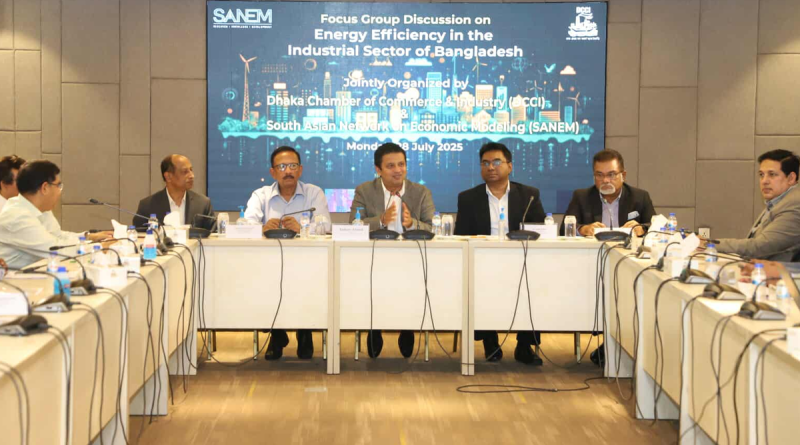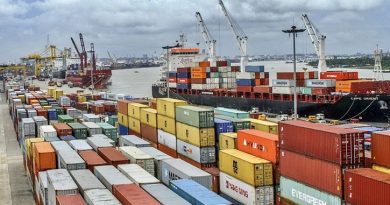Taskin Ahmed, President of the Dhaka Chamber of Commerce and Industry (DCCI), has emphasized the need for comprehensive behavioral change to enhance the country’s energy efficiency. Citing the current geopolitical context, he noted that Bangladesh’s private sector is under significant pressure, and the lack of consistent, quality energy supply to industries is causing delays in production, thereby reducing competitive capability.
He made these remarks at a joint discussion session organized by DCCI and the South Asian Network on Economic Modeling (SANEM). He stressed the importance of conducting regular energy audits in factories and called for the involvement of the education sector in industry-specific research along with proper industry mapping.
Experts’ Opinions and Policy Recommendations
Mohammad Wahid Hossain, Chairman of the Bangladesh Energy and Power Research Council (BEPRC), joined the event as the chief guest.
Dr. Selim Raihan, Executive Director of SANEM, stated that although an Energy Efficiency and Conservation Master Plan was created in 2016 and an Integrated Energy and Power Sector Master Plan in 2023, there is still no specific policy or action plan for energy efficiency, which needs urgent attention.
He added that there are definitional and conceptual differences regarding energy efficiency in various sectors of the country. Additionally, energy sourcing and supply face significant challenges. He suggested evaluating whether the plans regarding energy efficiency have been implemented, what incentives have been provided to industries, and how effective they have been.
BEPRC Chairman Wahid Hossain further noted a gap in the dissemination and availability of energy-related data, leaving many in the private sector unaware of existing government services in this domain. He emphasized bridging this gap.
He also pointed out that the private sector’s financial capacity has grown, and urged them to invest in energy-related research. Such involvement could help introduce new technologies, raise consumer awareness, and ultimately develop a sustainable, business-friendly energy policy.
Industry Voices and Concerns
Former DCCI President Ibrahim said that although major industrial units have access to energy, SMEs are severely affected by shortages, hampering production. Moreover, complicated loan processes have caused financing difficulties for small entrepreneurs, demanding urgent resolution.
Md. Rafiqul Alam, Additional Secretary (Operations) of the Energy and Mineral Resources Division, said that while the cost of importing each cubic unit of LNG is Tk 65–70, the government sells it for only Tk 30, requiring substantial subsidies.
He also noted that raising public awareness at all levels could lead to 5–15% energy savings, and stressed the need for more research and greater use of renewable energy, especially solar power.
Md. Zahidul Islam, Joint Secretary (Training), Power Division, said that 27% of total produced energy is currently consumed by industries, and this demand will rise to 40% by 2050. Efficient production and usage will make it possible to offer more affordable energy services to industries and the public.
Md. Imam Uddin Sheikh, General Manager (Production and Marketing), Petrobangla, shared that daily gas demand is 3,800 million cubic feet, but the supply is only 2,900 million, resulting in a shortfall of 900 million cubic feet. He urged entrepreneurs to set up factories near industrial zones to ensure energy access.
Engineer Mohammad Ahsanul Amin, GM (Production), BAPEX, admitted that adequate energy supply to industries is not being met, and to address this, 100 wells will be drilled across the country by 2030.
Shamim Ahmed, President of the Bangladesh Plastic Goods Manufacturers and Exporters Association (BPGMEA), called on the government to enhance private sector participation in LNG importation.
Mansur Ahmed, Senior Vice President of BKMEA, expressed concern over the declining natural gas extraction rate and stressed the need to diversify energy import sources and expand green financing. He also noted the importance of reducing dependence on LNG.
Inamul Haque Khan, Senior Vice President of BGMEA, highlighted that high energy prices are a key barrier to industrial growth, especially for new industrial setups. He mentioned that in Greater Gazipur, load shedding occurs for 6–8 hours daily, leading to extra costs of around Tk 400,000–500,000. Production delays are also hurting exports, weakening Bangladesh’s global competitiveness. He added that increasing renewable energy usage in factories by 10% could save 220 megawatts of energy, but lack of duty exemption on solar panel imports means entrepreneurs are forced to pay higher prices.
Open Discussion Participation
The open discussion was moderated by Dr. Selim Raihan, Executive Director of SANEM, and included participation from:
Md. Rezaul Karim Khan, Director, Bangladesh Energy Regulatory Commission
Mostafa Al Mahmud, President, Bangladesh Sustainable and Renewable Energy Association
Engineer Toufiq Rahman, Assistant Director (Standards & Labeling), SREDA
Govinda Chandra Laha, Chief Engineer (Planning & Design), Bangladesh Power Development Board
Md. Adil Chowdhury, Superintendent Engineer (Planning), Power Grid Company of Bangladesh PLC
Md. Moinuddin Khan, Superintendent Engineer (Grid, System Protection & Energy Audit), DESCO
Tanvir Ibne Bashar, Senior Assistant Vice President & Unit Head, IDCOL
Shankar Kumar Roy, Executive Director, Bangladesh Cement Manufacturers Association (BCMA)
Col. (Retd.) Engr. A.R. Mohammad Parvez Mozumder, Secretary General, Bangladesh Independent Power Producers Association
M. Mosaddek Hossain, Senior Vice President, Bangladesh Pharmaceutical Industries Association & Chairman, Unimed Unihealth Pharmaceuticals Ltd.
Dr. Suman Chowdhury, Secretary General, Bangladesh Steel Manufacturers Association
Engr. Md. Nurul Akhtar, CEO & Director, Energypac Electronics Ltd.
Also present were Md. Salim Soleman, Senior Vice President of DCCI, along with members of the Board of Directors.






